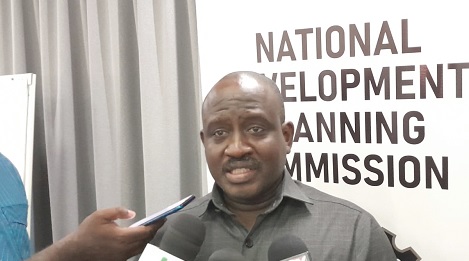
More communities get potable water despite pollution of water sources — Ministry Chief Director
The Chief Director of the Ministry of Sanitation and Water Resources, Noah Tumfo, has indicated that pollution of water sources has become a bane of water treatment.
He explained that the widespread pollution of water sources meant that the ministry and its agency, the Ghana Water Company Ltd, had to spend a lot of resources on treatment to make water safe for the inhabitants.
Mr Tumfo made this known when he addressed a two-day seminar on issues relating to the Water, Sanitation and Hygiene (WASH) at Akosombo in the Asuogyaman District in the Eastern Region on February 13.
Partners
The seminar, on the theme: "Effective Sector Coordination for Improved and Sustained WASH Service Delivery,” was being organised by the NDPC, Ministry of Sanitation and Water Resources, Hilton Foundation and IRC Ghana.
In attendance were representatives from the ministry's departments and agencies (MDAs), Metropolitan Municipal and District Assemblies (MMDAs), Civil Society Organisations (CSOs), Private Sector, Corporate Organisations, Academia and other development partners.
The seminar had the overall objective of addressing WASH gaps and ensuring universal access to safe drinking water services at all levels.
![]()
The participants in the seminar at Akosombo
It will also involve the filling in of WASH gaps and giving recommendations to support the attainment of WASH targets in an accelerated manner.
According to Mr Tumfo, apart from the pollution of the sources of water, it had also been identified that boreholes which the communities relied on for water, were not also safe.
Water testing
That, he indicated, had compelled the ministry to test the wholesomeness of the water after using a number of chemicals for purification.
That, Mr Tumfo stated, continued to pose a big financial obligation on the ministry and the National Development Planning Commission (NDPC).
"Despite the pollution of water sources and the salination of well water which we spend so much to make them pure, we are able to provide water to numerous communities", the chief director stated.
WASH targets
The Director-General of the National Development Planning Commission (NDPC), Dr Kwadwo Mensah who also addressed the participants, said although targets of WASH had been achieved, there was the need to effectively and efficiently coordinate its activities.
He said the ministry as well as the NDPC and other partners were on course to achieve the Sustainable Development Goals of 2030 for water and sanitation.
Dr Mensah said to achieve such a goal, it was necessary to organise a seminar for the various stakeholders to put inputs on how best to make that possible.
The demand for WASH services continue to increase with Ghana's population reaching 30.8 per cent and its level of urbanisation estimated to reach 70 per cent by the year 2047.
The WASH requirement to accompany such growth includes an expected improved water source of 99 per cent, household pipe water coverage at 90 per cent and the attainment of 2,262 m3/capita of internal fresh water resources with daily per capita water consumption of 300 litres.
Sanitation
Safe sanitation access is also expected to reach 95 per cent and these targets can only be achieved through a robust system and well-coordinated efforts and approaches.
The NDPC has provided technical support for planning and monitoring, documenting good WASH practices to accelerate the attainment of SDG6 and the preparation of WASH planning toolkits.
The overall objective of these efforts is aimed at addressing WASH gaps and ensuring universal access to WASH services at all levels.
Writer's email
